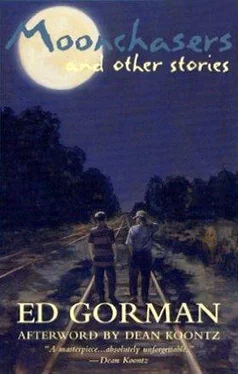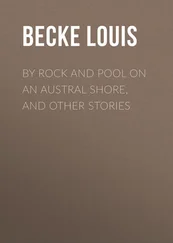And second of all, Roy looked kind of pissed off. Like maybe I really hadn’t done right by him.
“I’m sorry, Roy.”
And Roy said, “He’s got the money.”
“I know.”
And then Mitch said, “You can get the money, Tom. You’re a young man now. You’re not a boy anymore.”
And what was I going to do? Argue with Robert Mitchum, for whom there was no cooler guy in the entire known universe?
And then Roy said, “It’s in his house somewhere. That’s where you’ll find it.”
And then the dream was over and it was November 13 of a gray and frosty morning and I was just waking up and needing very badly to urinate and Mom was calling upstairs for breakfast and Debbie was in the bathroom gargling, which she always did very, very loudly.
— It’s in his house somewhere, Tom.
— You’re a young man now, Tom. You’re not a boy anymore.
in his house somewhere in his house somewhere in his house somewhere kept echoing through my mind the way it does in the movies sometimes.
And all the time I peed and all the time I showered and all the time I dressed and all the time I teased Debbie about her insistence on taking the first bowl of Sugar Frosted Flakes and all the time I walked along to school and all the time I played basketball in gym class during first period—
— all that time I just kept hearing it over and over and over and over again—
in his house somewhere in his house somewhere in his house somewhere.
After school, I went home and got out my bike. Strictly speaking, it was a little late in the year for the old Schwinn. People were bundled up inside parkas already. And the Offenberger kids had already built their first snowman of the year — they built them so tall that sometimes the Des Moines Register put them in the paper — and the streets were so icy in spots they were dangerous.
Cushing lived on the east edge of town where the houses grew much farther apart, and where the yards looked more like acreages because most of them had scrawny white chickens and grunting quick little hogs running around enclosed areas.
Cushing’s place was an old two-story white clapboard house with a big red barn in the back. It sat on four acres of farmland which somebody down the road owned and farmed. There was a fat oak tree across from it, so I pulled in over there so I could look more closely at the house.
A screened-in porch covered the front. On the right side of the place was another door. The windows were all dark in the drab gray November afternoon. Smoke curled from the chimney. There was no garage nor a driveway as such but there were two strips of concrete that the tires of a car would fit. The strips ran along the left side of the house. A lost and lonely-looking stray mutt ran around in frantic circles in the winter-flat cornfield.
Unless Cushing had his car out back or something, nobody was home. His night shift would start in another twenty minutes, just at four. He was probably already at the station.
I wanted to walk over to that side door, jimmy it open, go in and find the cash and then carry it straight to the chief’s office, drop it on his desk and then tell him where I got it.
Then I saw a black-and-white patrol car coming from a block and a half away so I quickly ran my bike down a slanting hill under a small bridge nearby. I waited there until I heard and felt the patrol car rumble over the ties overhead.
I didn’t want a patrolman telling Cushing that he’d seen me standing across the street from Cushing’s house.
It was completely dark and no more than twenty-five degrees when I left the house on foot that night.
It was a long walk to Cushing’s. I smoked three cigarettes on the way.
With no nearby streetlight, and no cars washing their headlight beams over the place, Cushing’s house was lost in shadow. There was only a quarter moon and a few stars bright above the flat fallen cornfield.
I went up to the front door. I had expected to find it securely locked and it was. I also expected to find the side door securely locked and, you guessed it, it was, too.
I went around back where against the left side of the small, enclosed back porch there was a latticework ensnarled with dead, spiky vines of some kind.
I was a good climber. At Scout camp I took merit badges in climbing — of course I also took merit badges, of the unofficial sort, in leading the most snipe hunts, using the most unique dirty words (a lot of which, to be honest, I more or less made up) and armpit farting, which is not necessarily something I’m proud of these days but I sure was at the time.
I went right up the latticework. I stood on the porch roof which was high enough so I could walk right over to the second-story window. I gave it a try. It was unlocked. I raised the bottom pane with no trouble at all.
One minute later, I stood in Cushing’s bedroom.
It smelled of: gas heat, sleep, cigarette smoke, minty aftershave, Wildroot hair oil and the same kind of bunion medicine Clarence used.
What I saw was: a well-made double bed, a large crucifix hanging above the headboard, a five-drawer bureau, two framed photographs of Cushing 1) in his marine uniform 2) in his Somerton police uniform. There was a shaggy throw rug on the floor, a tightly packed closet that smelled of mothballs, and a box filled with magazines and paperbacks, the former mostly Cavalier and the latter running to Gold Medals by people like David Goodis and Peter Rabe. It was tough to admit but Cushing and I liked the same kind of reading material.
I saw all these things in the narrow beam of my flashlight.
I spent twenty minutes in the room and found nothing spectacular except an extra handgun he kept in one drawer of the bureau and a can of lighter fluid and some underwear and socks and things in another. I then proceeded to go through the rest of the house.
I was there about an hour and a half. I learned that Cushing a) kept a tidy house b) was the proud owner of six fifths of Old Grandad bourbon c) used Trojans.
What I didn’t learn was where he kept the money he’d stolen from Roy. I looked in all the obvious places — cupboards, closets, the bottom of his clothes hamper — and then in all the not-so-obvious places... behind the couch... and under the three throw rugs on the living-room floor (in the Hardy Boys books, there were always lots of trapdoors sitting around).
And — nothing.
I stood in his dark living room, my beam off. I’d been going at it hard enough to work up a sweat. My heart pounded.
I still had the dream of taking the money to the chief and throwing it on his desk and—
The phone rang and scared the hell out of me.
I stood there trembling and feeling foolish for jumping up the way I had. It was loud and alien-sounding in the darkness of somebody else’s house...
It rang ten times and then was quiet. I decided now was the time to go. Maybe I hadn’t found the money but I hadn’t been caught, either.
I went back upstairs and out the window. Half a minute later, I stood on the porch roof looking at the barn out back. Talk about a perfect place to hide bank robbery loot.
Next time, I’d concentrate on the barn.
I climbed down the latticework and started around the side of the house and ran straight into Barney.
“What the hell’re you doing here?” I said.
“I followed you.”
“Followed me? For what?”
“I walk by your place just about every night after dinner but I’m always scared to come up to the door.”
“I shouldn’t have hit you that time, Barney. I’m sorry.”
“No, you should’ve hit me. You should’ve beat the shit out of me. The way I let Roy down, I mean. I’m the one who should be sorry.”
Читать дальше












